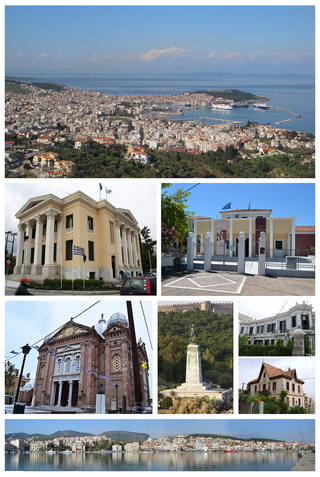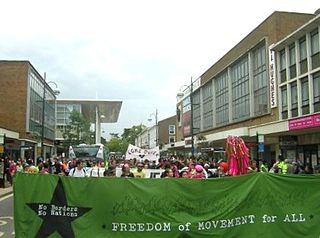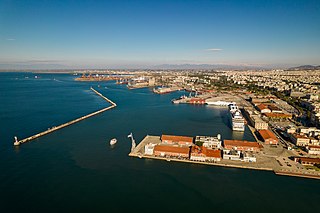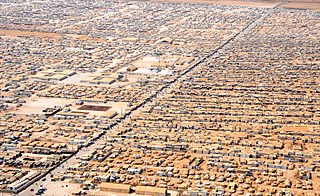Related Research Articles

Thessaloniki, also known as Thessalonica, Saloniki, Salonika, or Salonica, is the second-largest city in Greece, with slightly over one million inhabitants in its metropolitan area, and the capital of the geographic region of Macedonia, the administrative region of Central Macedonia and the Decentralized Administration of Macedonia and Thrace. It is also known in Greek as "η Συμπρωτεύουσα", literally "the co-capital", a reference to its historical status as the Συμβασιλεύουσα or "co-reigning" city of the Byzantine Empire alongside Constantinople.

Mytilene is the capital of the Greek island of Lesbos, and its port. It is also the capital and administrative center of the North Aegean Region, and hosts the headquarters of the University of the Aegean. It was founded in the 11th century BC.

The No Border Network refers to loose associations of autonomous organisations, groups, and individuals in Western Europe, Central Europe, Eastern Europe and beyond. They support freedom of movement and resist human migration control by coordinating international border camps, demonstrations, direct actions, and anti-deportation campaigns.

A refugee camp is a temporary settlement built to receive refugees and people in refugee-like situations. Refugee camps usually accommodate displaced people who have fled their home country, but camps are also made for internally displaced people. Usually, refugees seek asylum after they have escaped war in their home countries, but some camps also house environmental and economic migrants. Camps with over a hundred thousand people are common, but as of 2012, the average-sized camp housed around 11,400. They are usually built and run by a government, the United Nations, international organizations, or non-governmental organization. Unofficial refugee camps, such as Idomeni in Greece or the Calais jungle in France, are where refugees are largely left without the support of governments or international organizations.
Aliyah Bet was the code name given to illegal immigration by Jews, many of whom were refugees escaping from Nazi Germany or other Nazi-controlled countries, and later Holocaust survivors, to Mandatory Palestine between 1920 and 1948, in violation of the restrictions laid out in the British White Paper of 1939, which dramatically increased between 1939 and 1948. With the establishment of the State of Israel in May 1948, Jewish displaced persons and refugees from Europe began streaming into the new state in the midst of the 1948 Palestine war.

Kalamariá is among the most densely populated suburbs in Thessaloniki, located about 7 kilometres southeast of the downtown area, with a population of 92,248.

Macedonia is a geographic and former administrative region of Greece, in the southern Balkans. Macedonia is the largest and second-most-populous geographic region in Greece, with a population of 2.36 million. It is highly mountainous, with major urban centres such as Thessaloniki and Kavala being concentrated on its southern coastline. Together with Thrace, along with Thessaly and Epirus occasionally, it is part of Northern Greece. Greek Macedonia encompasses entirely the southern part of the wider region of Macedonia, making up 51% of the total area of that region. Additionally, it widely constitutes Greece's borders with three countries: Albania to the northwest, North Macedonia to the north, and Bulgaria to the northeast.

Rushen, formally Kirk Christ Rushen, is one of the seventeen historic parishes of the Isle of Man.

The Great Thessaloniki Fire of 1917 destroyed two thirds of the city of Thessaloniki, the second-largest city in Greece, leaving more than 70,000 homeless. The fire burned for 32 hours and destroyed 9,500 houses within an extent of 1 square kilometer. Half the Jewish population emigrated from the city as their livelihoods were gone. Rather than quickly rebuilding, the government commissioned the French architect Ernest Hébrard to design a new urban plan for the burned areas and for the future expansion of the city. His designs are still evident in the city, most notably Aristotelous Square, although some of his most grandiose plans were never completed due to a lack of funds. French navy official Dufour de la Thuillerie writes in his report that "I saw Thessaloniki, a city of more than 150,000 people, burn".

The history of the Jews of Thessaloniki reaches back two thousand years. The city of Thessaloniki housed a major Jewish community, mostly Eastern Sephardim, until the middle of the Second World War. Sephardic Jews immigrated to the city following the expulsion of Jews from Spain by Catholic rulers under the Alhambra Decree of 1492. It is the only known example of a city of this size in the Jewish diaspora that retained a Jewish majority for centuries. This community influenced the Sephardic world both culturally and economically, and the city was nicknamed la madre de Israel.
Idomeni or Eidomeni is a small village in Greece, near the border with North Macedonia. The village is located in the municipality of Paeonia, Kilkis regional unit of Central Macedonia (Greece).

The Port of Thessaloniki is the main maritime gateway to Southeast, Central and Eastern Europe, strategically located in Northern Greece close to the major Trans-European motorway and railway networks with direct access to the Southeastern European countries. ThPA S.A., listed on the Athens Stock Exchange since 2001, handles containers, conventional cargo, operates the free zone of the Port in accordance with tax and customs legislation currently in force authorized with AEO License, offers reliable and efficient logistics solutions and intermodal rail services and serves passenger traffic through cruise and ferry.

Vietnamese boat people were refugees who fled Vietnam by boat and ship following the end of the Vietnam War in 1975. This migration and humanitarian crisis was at its highest in the late 70s and early 80s, but continued well into the early 1990s. The term is also often used generically to refer to the Vietnamese people who left their country in a mass exodus between 1975 and 1995. This article uses the term "boat people" to apply only to those who fled Vietnam by sea.
Dbayeh is a city in Lebanon located on the Mediterranean Sea in the Matn District, Mount Lebanon, between Beirut and Jounieh. The majority of the population is Christian(Maronites, and Orthodox), apart from some people from the gulf who lived there during the summer season.

Syrian refugee camp and shelters are temporary settlements built to receive internally displaced people and refugees of the Syrian Civil War. Of the estimated 7 million persons displaced within Syria, only a small minority live in camps or collective shelters. Similarly, of the 8 million refugees, only about 10 percent live in refugee camps, with the vast majority living in both urban and rural areas of neighboring countries. Beside Syrians, they include Iraqis, Palestinians, Kurds, Yazidis, individuals from Somalia, and a minority of those who fled the Yemeni and Sudanese civil wars.

The Calais Jungle was a refugee and immigrant encampment in the vicinity of Calais, France, that existed from January 2015 to October 2016. There had been other camps known as "jungles" in previous years, but this particular shanty town drew global media attention during the peak of the European migrant crisis in 2015, when its population grew rapidly. Migrants stayed at the camp while they attempted to enter the United Kingdom, or while they waited for their French asylum claims to be processed.

Migrants have gathered in and around Calais, on the northern French coast, since at least the late 1990s seeking to enter the United Kingdom from the French port by crossing the Channel Tunnel or stowing away in the cargo area of lorries heading for ferries that cross the English Channel. During this time, informal camps of migrants have formed, the most notorious commonly referred to as the Calais Jungle. Other migrants come to the area because they are homeless while seeking asylum in France. The presence of migrants in and around Calais has affected the British and French governments, the Eurotunnel and P&O Ferries companies, and lorry drivers heading for the UK and their companies. EuroTunnel, the company that operates the Channel Tunnel, said that it intercepted more than 37,000 migrants between January and July 2015.
Edlumino Education Aid is a nonprofit charity working to improve education for disadvantaged and displaced children around the world. It is a non-governmental organisation (NGO) registered with the UK Charity Commission as charity number 1166131. Edlumino is based in Cambridge and the date of registration was 18 March 2016.

This is a timeline of the European migrant crisis of 2015 and 2016.
Diavata refugee camp is a military-run refugee camp located in Diavata, a community belonging to the municipality of Delta, Central Macedonia, Greece. The camp opened on 24 February 2016 to host Syrian, Afghan and Iraqi refugees fleeing the Syrian civil war, the long-ongoing Afghan conflict and the Iraq War. The camp has capacity for 2500 refugees and as of 1 July 2016, hosts 1,744 refugees in 171 tents and 134 RHUs.
References
- ↑ "Site Profile: Thessaloniki Port" (PDF). UNHCR. 14 April 2016. Retrieved 3 July 2016.